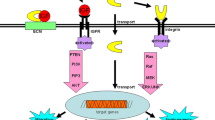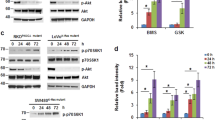Abstract
Nuclear factor-kappaB (NF-κB) is a transcription factor that is activated in various neoplasms, including gastric cancer. Insulin-like growth factor binding protein-3 (IGFBP-3) is a potent tumor suppressor and is significantly suppressed in a variety of cancers. Although IGFBP-3 has been reported to have antiproliferative and proapoptotic effects, the precise mechanisms underlying the action of IGFBP-3 have not been elucidated. In this study, we found an inverse correlation between NF-κB activity and IGFBP-3 expression in patients with gastric cancer. Overexpression of IGFBP-3 resulted in significant inhibition of total and phosphorylated p65 NF-κB and IκB proteins in gastric cancer cells. IGFBP-3 further inhibited the expression of NF-κB-regulated cell adhesion molecules, ICAM-1 and VCAM-1. Finally, the growth inhibition induced by etoposide was significantly enhanced by IGFBP-3 overexpression along with concomitant suppression of NF-κB activity. These findings indicate that IGFBP-3 enhances etoposide-induced cell growth inhibition by blocking the NF-κB signaling pathway in gastric cancer cells. Furthermore, our data suggest that IGFBP-3 could be used as an adjuvant in the treatment of gastric cancer.



Similar content being viewed by others
References
Kartin M, Lin A (2002) Nuclear factor-kappaB at the crossroads of life and death. Nat Immunol 3:221–227
Pahl HL (1999) Activators and target genes of Rel/NF-kappaB transcription factors. Oncogene 18:6853–6866
Sasaki N, Morisaki T, Hashizume K, Yao T, Tsuneyoshi M, Noshiro H, Nakamura K, Yamanaka T, Uchiyama A, Tanaka M, Katano M (2001) Nuclear factor-kappaB p65 (RelA) transcription factor is constitutively activated in human gastric carcinoma tissue. Clin Cancer Res 7:4136–4142
Liu CA, Wang MJ, Chi CW, Wu CW, Chen JY (2004) Rho/Rhotekin-mediated NF-kappaB activation confers resistance to apoptosis. Oncogene 23:8731–8742
Daughaday WH (1990) The possible autocrine/paracrine and endocrine roles of insulin-like growth factors of human tumors. Endocrinology 127:1–4
King GL, Kahn CR, Rechler MM, Nissley SP (1980) Direct demonstration of separate receptors for growth activities of insulin and multiplication-stimulating activity (an insulin-like growth factor) using antibodies to the insulin receptor. J Clin Investig 66:130–140
Baxter RC, Martin JL (1989) Binding proteins for the insulin-like growth factor: structure, regulation and function. Prog Growth Factor Res 1:49–68
Jogie-Brahim S, Feldman D, Oh Y (2009) Unraveling IGFBP-3 actions in human disease. Endocr Rev 30:417–437
Liu B, Lee HY, Weinzimer SA, Powell DR, Clifford JL, Kurie JM, Cohen P (2000) Direct functional interactions between insulin-like growth factor binding protein-3 and retinoid X receptor α regulate transcriptional signaling and apoptosis. J Biol Chem 275:23462–23470
Martin JL, Coverley JA, Pattison ST, Baxter RC (1995) Insulin-like growth factor-binding protein-3 production by MCF-7 breast cancer cells: stimulation by retinoic acid and cyclic adenosine monophosphate and differential effects of estradiol. Endocrinology 136:1219–1226
Oh Y, Muller HL, Lamson G, Rosenfeld RG (1993) Insulin-like growth factor (IGF)-independent action of IGFBP-3 in Hs578T human breast cancer cells. Cell surface binding and growth inhibition. J Biol Chem 268:14964–14971
Ingermann AR, Yang YF, Paisley TE, Han J, Mikami A, Garza AE, Mohanraj L, Fan L, Idowu M, Ware JL, Kim HS, Lee DY, Oh Y (2010) Identification of a novel cell death receptor mediating IGFBP-3-induced antitumor effects in breast and prostate cancer. J Biol Chem 285:30233–30246
Williams AC, Smartt H, H-Zadeh AM, Macfarlane M, Paraskeva C, Collard TJ (2007) Insulin-like growth factor binding protein 3 (IGFBP-3) potentiates TRAIL-induced apoptosis of human colorectal carcinoma cells through inhibition of NF-kappaB. Cell Death Differ 14:137–145
Han J, Jogie-Brahim S, Harada A, Oh Y (2011) Insulin-like growth factor-binding protein-3 suppresses tumor growth via activation of caspase-dependent apoptosis and cross-talk with NF-kB signaling. Cancer Lett 307:200–210
Danaei G, Hoorn V, Lopez AD, Murray CJ, Ezzati M (2005) Causes of cancer in the world: comparative risk assessment of nine behavioural and environmental risk factors. Lancet 365:1784–1793
Wu W, Cho CH, Lee CW, Fan D, Wu K, Yu J, Sung J (2010) Dysregulation of cellular signaling in gastric cancer. Cancer Lett 295:144–153
Yi HK, Hwang PH, Yang DH, Kang CW, Lee DY (2001) Expression of the insulin-like growth factors (IGFs) and the IGF-binding proteins (IGFBPs) in human gastric cancer cells. Eur J Cancer 37:2257–2263
Durrant LG, Watson SA, Hall A, Morris DL (1991) Co-stimulation of gastrointestinal tumor cell growth by gastrin, transforming growth factor α and insulin-like growth factor-I. Br J Cancer 63:7–70
Yi HK, Kim SY, Hwang PH, Kim CY, Yang DH, Oh Y, Lee DY (2005) Impact of PTEN on the expression of insulin-like growth factors (IGFs) and IGF-binding proteins in human gastric adenocarcinoma cells. Biochem Biophys Res Commun 330:760–767
Fougues M, Marrogi AJ, Spillare EA, Wu CG, Yang Q, Yoshida M, Wang XW (2001) Interaction of the hepatitis B virus X protein with the Crm1-dependent nuclear export pathway. J Biol Chem 276:22797–22803
Giri DK, Aggarwal BB (1998) Constitutive activation of NF-kB causes resistance to apoptosis in human cutaneous T cell lymphoma HuT-78 cells. Autocrine role of tumor necrosis factor and reactive oxygen intermediates. J Biol Chem 273:14008–14014
Kiriakidis S, Andreakos E, Monaco C, Foxwell B, Feldmann M, Paleolog E (2003) VEGF expression in human macrophages in NF-kappaB-dependent. Studies using adenoviruses expressing the endogenous NF-kappaB inhibitor IkappaBalpha and a kinase-defective form of the IkappaB kinase 2. J Cell Sci 116:665–674
Yoshida S, Ono M, Shono T, Izumi H, Ishibashi T, Suzuki H, Kuwano M (1997) Involvement of interleukin-8, vascular endothelial growth factor, and basic fibroblast growth factor in tumor necrosis factor alpha-dependent angiogenesis. Mol Cell Biol 17:4015–4023
Egeblad M, Werb Z (2002) New functions for the matrix metalloproteinases in cancer progression. Nat Rev Cancer 2:161–174
Kim BY, Kim KA, Kwon O, Kim SO, Kim MS, Kim BS, Oh WK, Kim GD, Jung M, Ahn JS (2005) NF-kappaB inhibition radiosensitizes ki-ras-transformed cells to ionizing radiation. Carcinogenesis 26:1395–1403
Gangadharan C, Thoh M, Manna SK (2009) Inhibition of constitutive activity of nuclear transcription factor kappaB sensitizes doxorubicin-resistant cells to apoptosis. J Cell Biochem 107:203–213
Ye S, Long YM, Rong J, Xie WR (2008) Nuclear factor kappa B: a marker of chemotherapy for human stage IV gastric carcinoma. World J Gastroenterol 14:4739–4744
Salmon WDJ, Daughaday WH (1957) A hormonally controlled serum factor which stimulates sulfate incorporation by cartilage in vitro. J Lab Clin Med 49:825
Chan JM, Stampfer MJ, Giovannucci E, Gann PH, Ma J, Wilkinson P, Hennekens CH, Pollak M (1998) Plasma insulin-like growth factor-I and prostate cancer risk: a prospective study. Science 279:563–566
Hankinson SE, Willett WC, Colditz GA, Hunter DJ, Michaud DS, Deroo B, Rosner B, Speizer FE, Pollak M (1998) Circulating concentrations of insulin-like growth factor-I and risk of breast cancer. Lancet 351:1393–1396
Butt AJ, Dickson KA, Jambazov S, Baxter RC (2005) Enhancement of tumor necrosis factor-alpha-induced growth inhibition by insulin-like growth factor-binding protein-5 (IGFBP-5), but not IGFBP-3 in human breast cancer cells. Endocrinology 146:3113–3122
H-Zadeh AM, Collard TJ, Malik K, Hicks DJ, Paraskeva C, Williams AC (2006) Induction of apoptosis by the 16-kDa amino-terminal fragment of the insulin-like growth factor binding protein 3 in human colonic carcinoma cells. Int J Oncol 29:1279–1286
Lee DY, Yi HK, Hwang PH, Oh Y (2002) Enhanced expression of insulin-like growth factor binding protein-3 sensitizes the growth inhibitory effect of anticancer drugs in gastric cancer cells. Biochem Biophys Res Commun 294:480–486
Calzado MA, Bacher S, Schmitz ML (2007) NF-kappaB inhibitors for the treatment of inflammatory diseases and cancer. Curr Med Chem 14:367–376
Luo JL, Kamata H, Karin M (2005) IKK/NF-kappaB signaling. Balancing life and death-a new approach to cancer therapy. J Clin Invest 115:2625–2632
Acknowledgments
We would like to gratefully thank professor Y. Oh (Virginia Commonwealth University, Virginia, USA) for helpful discussion and insights.
Conflict of interest
The authors declare no conflict of interest.
Author information
Authors and Affiliations
Corresponding author
Rights and permissions
About this article
Cite this article
Kim, M.S., Lee, DY. Insulin-like growth factor binding protein-3 enhances etoposide-induced cell growth inhibition by suppressing the NF-κB activity in gastric cancer cells. Mol Cell Biochem 403, 107–113 (2015). https://doi.org/10.1007/s11010-015-2341-2
Received:
Accepted:
Published:
Issue Date:
DOI: https://doi.org/10.1007/s11010-015-2341-2




